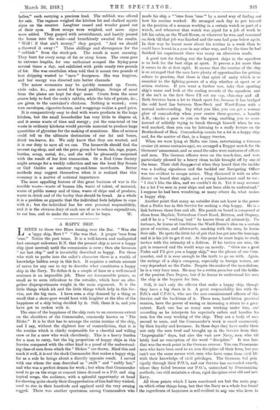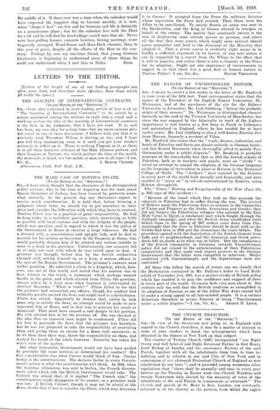A HAPPY SHIP.
T ,ISTEN to those two Blues leaning over the Bar. " Was she
a 'appy ship, Bert ? " " She was that. A proper 'ome from 'ome." Notice the past tense. It is a well-known and undisputed fact amongst sailormen R.N. that the present ship is never a happy ship (just neutral) until the commission is over ; then she becomes " me last ship " and is invariably described as happy. For those who wish to probe into the sailor's character there is a wealth of knowledge hidden away in this fact. It requires a certain amount of nerve for any one to try to describe what constitutes a happy ship in the Navy. To define it in a couple of lines or a well-turned sentence is an impossible job. There are innumerable points, so small as to seem ridiculous to the outsider, which bear an alto- gether disproportionate weight in the main argument. It is the little things which irk and the little things which help in this Ser- vice, not the big ones. I have seen a ship damned by a thing so small that a shore-goer would hoot with laughter at the idea of the happiness of a ship being decided by it. Still, there it is, and you have got to reckon with it.
The onus of the happiness of the ship rests to an enormous extent on the shoulders of the Commander, commonly known as " The Bloke." It is he that has to arrange the entire routine of the ship, and I say, without the slightest fear of contradiction, that it is the routine which is chiefly responsible for a cheerful and willing crew or for a crew who work cheerlessly. This is a heavy burden for a man to carry, but the big proportion of happy ships in this Service compared with the other kind is a proof of the understand- ing class of men from which the " Blokes " are drawn. Mind this and mark it well, it is not the slack Commander that makes a happy ship, for as a rule he brings about a directly opposite result. I served with one whom the men described as " swift " and " ruddy hot," and who was a perfect demon for work ; but when that Commander used to go on the stage at concert times dressed as a P.O. and sing topical songs, the audience, with a splendid opportunity at hand for showing quite clearly their disapprobation of him had they wished, used to rise in their hundreds and applaud until the very awning sagged. There was another sportsman among Commanders who made his ship a "'ome from 'ome " by a novel way of finding out how his routine worked. He arranged each day to put himself in the position of a seaman working in a certain watch or part of a watch, and whenever that watch was piped for a job of work he left his cabin, or the Ward-Room, or wherever he was, and remained on deck till that job was finished and the men had gone below again. In that way he learnt more about his routine in a week than he could have learnt in a year in any other way, and by the time he had finished his experiment there was many an alteration made.
A good test for finding out the happiest ships in the squadron is to look for the best ships at sport. It proves a lot more than it seems to do at first sight. It means that tho routine of the ship is so arranged that the men have plenty of opportunities for getting ashore to practise, that there is that spirit of unity which is so essential to the fighting-powers of a ship whether at sport or at action stations. If you want a further test, take that sporting ship's name and look at the coaling records of the squadron and if she isn't in the first three I'll eat any cap, chin-stay and all Both Services have a lot to thank sport for, because it has bridged the cold hard line between Mess-Deck and Ward-Room with a mutual understanding. Say what you like, you can get a warmer glow of comradeship when your centre three-quarter, a humble A.B., chucks a pass to you on the wing, enabling you to score, instead of selfishly trying to break through himself when he was well marked, than you can by listening to a stuffy lecture on the Brotherhood of Man. Comradeship counts for a lot in a happy ship, and, for the matter of that, in a happy Service.
When we were lying at Malta one time, entertaining a German cruiser (it seems centuries ago), we arranged a Rugger match for the Germans' amusement, and as usual the sides were mixtures of officers and men. The German officers were on the touch-line, and were particularly pleased by a heavy clean tackle brought off by one of the team. Their chill disapproval when they heard that the tackler was a leading signalman and the tackled our Navigating Officer was too evident to escape notice. They discussed it with us aftor dinner on board that night, and a young Lieutenant said to me : " I don't like the idea, and we couldn't do it. Yet it may account for a lot I've seen in your ships and not been able to understand." I suppose he had been wondering, as many others do, what makes a happy ship.
Another point that many an outsider does not know is the power that a Padre has in this Service for making a ship happy. He is a link between those fore and aft. His parish on board is composed of slices from Mayfair, Tottenham Court Road, Brixton, and Stepney, and if he is a " working 'and " he knows them all intimately. For instance, he learns at lunchtime the Ward-Room's idea on a certain piece of routine, and afterwards, smoking with the men, he learns their side. He spots the little bit of grit that has got into the bearings, and it is his job to get it out. At this point he must begin to study tactics with the intensity of a Jellicoe. If his tactics are wise, the grit is removed and the world wags on merrily. " Give me a good Padre and I'll give you a happy ship," was the phrase of one Com- mander, and it is near enough to the truth to go on with. Again, the outings of a ship's company, especially in foreign waters, are very dependent on the Padre. Despite the smiles of the incredulous, he is a very busy man. He may be a rotten preacher and the holder of the poorest Pass Degree, but if he learns to understand his men the ship is the happier for him.
Still, it isn't only the officers that make a happy ship, though they have a big share in it. A great responsibility lies with the P.O.'s and C.P.O.'s, who are the non-commissioned officers of this Service and the backbone of it. These men, hard-bitten practical
seamen, have the power of easing or increasing a strain to a. great extent. Each one has so many men working under him, and according as he interprets his superior's orders and handles his men lies the easy working of the ship. They are a body of mon
second to none, and the Commander's work is eased enormously by their loyalty and keenness. In these days they have under them not only the men bred and brought up in the Service from their ' Impregnable ' days, but also the vast new Navy, men who till lately had no conception of the word " discipline." It was here that was the weak point in the German armour. You can Prussianize men who have been used to an iron discipline all their lives, but you can't use the same means with men who have come from civil life with their knowledge of civil privileges. The Germans fail prin- cipally through their P.O.'s, and our Service has succeeded exactly where they failed because our P.O.'s, untouched by Prussianizing methods, can still maintain a clean, rigid discipline over old and new Navy.
All these points which I have mentioned are but the main pegs on which other things hang, but that the Navy as a whole has found the ingredients of happiness is self-evident to any one who lives iu
the middle of it. If there ever was a time when the onlooker would have expected the happiest ship to become mouldy, it is now, when " drops o' leaf " arc few and far between and life is distinctly on a monotonous plane ; but let the onlooker live with the Fleet for a bit and he will find his forebodings vanish into thin air. Never were boat-pulling keener, concerts heartier, boxing meetings more frequently arranged, Ward-Room and Mess-Deck cheerier, than in this year of grace, despite all the efforts of the Hun to the con- trary. Perhaps by now my one-time friend, that young German Lieutenant, is beginning to understand some of those things he
could not understand when I met him at Malta: Bisu.



























 Previous page
Previous page